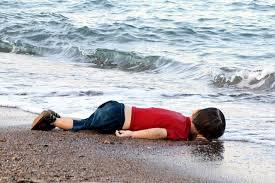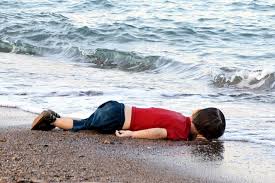
The fate of the 364,183 migrants who have landed on the continent’s southern shores in 2015 are still uncertain as the European leaders continue to argue over who ought to take responsibility for them.
The fragmented approach by the European leaders has been criticized by the U.N.’s High Commissioner for Refugees.
“Europe is facing a moment of truth. This is the time to reaffirm the values upon which it was built,” said Antonio Guterres, the U.N.’s High Commissioner for Refugees on Friday.
With 60 million people displaced by conflict, persecution and grinding poverty, this is the worst refugee crisis that the world has faced since the end of the Second World War.
The pictures of the dead body of a three-year-old Syrian boy, Aylan Kurdi, lying dead on the shores of a Turkish beach went viral throughout the globe had put some pressure on the EU leaders. The toddler reportedly died after the small boat that he was travelling in along with his family capsized on way to Greece. The family had fled Syria endangered by the continuing civil war in the country.
British Prime Minister David Cameron, who had earlier rejected the idea of Britain taking more refugees, said that as a father, he felt “deeply moved” by the image. On Friday Cameron announced in Lisbon that UK would help resettle “thousands” of Syrians from U.N. refugee camps in the Middle East.
UK was further pressurized by a petition on the U.K. Parliament’s website calling on Britain to accept more refugees received three times as many signatures as it needed to be considered by lawmakers, far exceeding the 100,000 signature threshold.
AP, quoting a spokeswoman for the U.N., reported that Britain will take a further 4,000 Syrian refugees from camps in the Middle East.
“We obviously welcome very much the move to increase resettlement spaces for Syrians in the UK.
Those spaces are going to be critical to the lives and future of 4,000 people,” said Melissa Fleming.
Ireland announced their intention to accept over 2,000 additional refugees – though it would not be obligated to do so under an E.U.-wide deal. With respect to refugee intake, both Britain and Ireland have taken in fewer of them compared to other EU member states like Sweden, Germany, Austria and France.
The EU Council had increased the earlier estimate of the number of refugees to 100,000 from an earlier estimate of 40,000. However this figure, that the Council President Donald Tusk appealed to the E.U. to redistribute, would be much less than the actual number of refugees.
Germany has been quite lenient in taking in of refugees. Apart from suspending the EU Dublin Refugee registration that mandates the migrants to be registered in the country they enter EU, on Monday German Chancellor Angela Merkel announced that the country was ready to take at least 800,000 asylum-seekers this year and urged other countries to establish quotas and rules to do their part.
France also stood for the refugee acceptance and its president François Hollande said: “today what exists is no longer enough. We will need to go further.”
However other countries were not as lenient.
“This is not a European problem, it’s a German problem. All of them would like to go to Germany,” said Hungary’s nationalist Prime Minister Victor Orban.
He further stressed that quotas were not the answer claiming that quota creation can act as an invitation.
Acknowledging the divide, EU leaders strive to arrive at a common ground.
“A deeper split of the union is a risk we cannot exclude,” said European Parliament speaker Martin Schulz on Thursday.
(Source:www.time.com)
The fragmented approach by the European leaders has been criticized by the U.N.’s High Commissioner for Refugees.
“Europe is facing a moment of truth. This is the time to reaffirm the values upon which it was built,” said Antonio Guterres, the U.N.’s High Commissioner for Refugees on Friday.
With 60 million people displaced by conflict, persecution and grinding poverty, this is the worst refugee crisis that the world has faced since the end of the Second World War.
The pictures of the dead body of a three-year-old Syrian boy, Aylan Kurdi, lying dead on the shores of a Turkish beach went viral throughout the globe had put some pressure on the EU leaders. The toddler reportedly died after the small boat that he was travelling in along with his family capsized on way to Greece. The family had fled Syria endangered by the continuing civil war in the country.
British Prime Minister David Cameron, who had earlier rejected the idea of Britain taking more refugees, said that as a father, he felt “deeply moved” by the image. On Friday Cameron announced in Lisbon that UK would help resettle “thousands” of Syrians from U.N. refugee camps in the Middle East.
UK was further pressurized by a petition on the U.K. Parliament’s website calling on Britain to accept more refugees received three times as many signatures as it needed to be considered by lawmakers, far exceeding the 100,000 signature threshold.
AP, quoting a spokeswoman for the U.N., reported that Britain will take a further 4,000 Syrian refugees from camps in the Middle East.
“We obviously welcome very much the move to increase resettlement spaces for Syrians in the UK.
Those spaces are going to be critical to the lives and future of 4,000 people,” said Melissa Fleming.
Ireland announced their intention to accept over 2,000 additional refugees – though it would not be obligated to do so under an E.U.-wide deal. With respect to refugee intake, both Britain and Ireland have taken in fewer of them compared to other EU member states like Sweden, Germany, Austria and France.
The EU Council had increased the earlier estimate of the number of refugees to 100,000 from an earlier estimate of 40,000. However this figure, that the Council President Donald Tusk appealed to the E.U. to redistribute, would be much less than the actual number of refugees.
Germany has been quite lenient in taking in of refugees. Apart from suspending the EU Dublin Refugee registration that mandates the migrants to be registered in the country they enter EU, on Monday German Chancellor Angela Merkel announced that the country was ready to take at least 800,000 asylum-seekers this year and urged other countries to establish quotas and rules to do their part.
France also stood for the refugee acceptance and its president François Hollande said: “today what exists is no longer enough. We will need to go further.”
However other countries were not as lenient.
“This is not a European problem, it’s a German problem. All of them would like to go to Germany,” said Hungary’s nationalist Prime Minister Victor Orban.
He further stressed that quotas were not the answer claiming that quota creation can act as an invitation.
Acknowledging the divide, EU leaders strive to arrive at a common ground.
“A deeper split of the union is a risk we cannot exclude,” said European Parliament speaker Martin Schulz on Thursday.
(Source:www.time.com)





